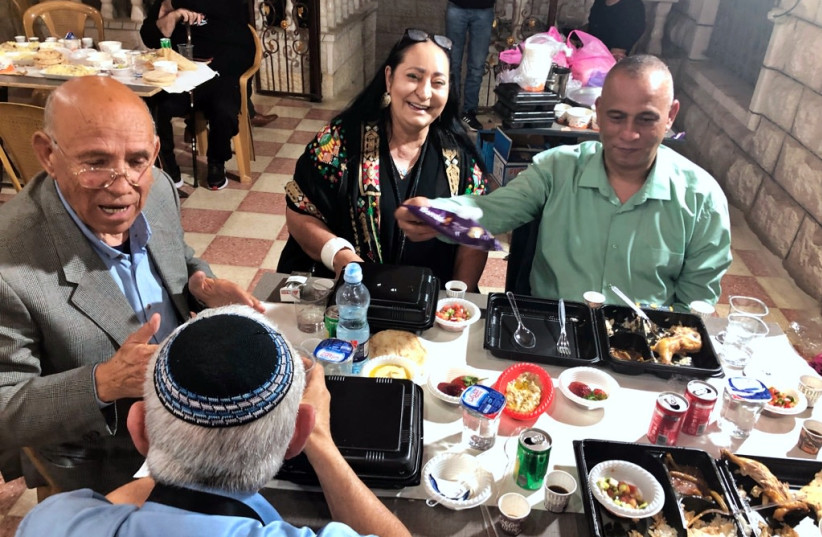Local Palestinian leader Mohammed Nasser of Dura has been called a traitor for speaking with Israelis.
He was not afraid, therefore, to attend a kosher iftar meal in the West Bank city of Hebron with Israeli guests, including settler leaders from the city’s Jewish community.
“If you mention Mohammed Nasser in the West Bank, they will tell you he is the first man for Israel,” Nasser told the several dozen guests who sat on the porch of Hebron businessman Ashraf Jabari on Tuesday night.
A veteran peacemaker, Nasser has spoken with Israeli presidents, prime ministers, parliamentarians, congressmen, writers, and poets. He has also traveled to Washington to advocate for peace.
Nasser said he is in conversation with South Hebron Hills Regional Council Yohai Damri and has spoken with the Knesset Foreign Affairs and Defense Committee chairman Ram Ben-Barak.

“I know each and every president of Israel, even prime ministers,” he said. “Either they were at my home or I met them in their offices,” he told the several dozen guests at the iftar meal, which offered kosher guests meals prepared in the nearby Kiryat Arba settlement.
An electrician by trade, Nasser recalled how in 1982 when he was “chief of the village league,” he called for a conference under the “slogan ‘yes to peace’.”
Even the Israelis were concerned he was a traitor, Nasser recalled.
Nasser explained that these ties have come at a cost. “We are suffering a lot because of our relationship with you,” he said.
“You will enjoy the night and you will go back, but everyone in the area will start saying Ashraf Jabari, he received Jews, he is a quisling [traitor].”
“You have to protect those people who have sympathy with you […] I ask you to support those people who are saying peace to you,” Nasser advised.
The event was hosted by both Jabari and the Judea and Samaria Chamber of Commerce, of which he and Ariel resident Avi Zimmerman are co-founders. Jabari began the tradition of a kosher Iftar in 2019 when US President Donald Trump was in the White House and saw Palestinians like Jabari as grassroots alternatives to the Palestinian Authority. That same year Jabari ignored a PA ban and attended the US-sponsored economic conference in Bahrain.
Jabari’s first iftar included a number of Israeli-Arab business people. In 2020, he held a virtual iftar event and last year there were a number of Yesha members at the meal.
Hebron has a bitter history of Israeli-Palestinian violence, but on Jabari’s porch, he and his Muslim and Jewish guests showed another side of relations in the city.
Members of the Hebron Jewish community have attended each of Jabari’s four iftar celebrations. One of its spokespeople, Yishai Fleisher, recalled for the guests on Tuesday how Jabari had helped him fulfill his mother’s wish to have fireworks explode over the Tomb of the Patriarchs in honor of his daughter’s bat mitzvah, which occurred just before the advent of the COVID-19 pandemic.
Fleisher recalls that when those in the bat mitzvah party saw the night sky light up they said: “’What a coincidence.’ I said, ‘No, I organized this, I have friends on the Arab side’ and they said, ‘No, no, you don’t, you are joking.’”
The guests didn’t believe him, Fleisher recalls, but the friendship is very real.
“For us, this relationship is very important,” Fleisher said. “Maybe for Ashraf it’s important, but, for us, maybe it’s more important. A lot of people around the world want to accuse us of racism and want to say that we hate Arabs. No, we hate jihadists. We hate people who want to make war against us.”
“There is a lot of joint activity the two communities can do together to improve the city,” Fleisher said, adding that people like Jabari make such joint activity possible.
Attorney Kobi Kamar of Jerusalem, invited by a friend, said he had imagined that he was going to a left-wing event and found himself instead in a room of right-wingers.
“I have found here a reality I had not imagined,” he said, explaining that it was a reality that did not conform to the stereotypes.
Hebron Jewish community spokesman Noam Arnon said that Jews and Muslims had been neighbors in Hebron for centuries and were neighbors as well today.
“We have to make sure that the future of this area will be a future of peace,” Arnon said.
Given the biblical roots of the city that date back to Abraham, Hebron could be a thriving tourist city, Arnon said.
Zimmerman said it was important to emphasize that the ties that brought Jews and Muslims together on the porch were those of “neighbor to neighbor.”
“The idea that the rest of the world is looking at this region as Palestinians and settlers doesn’t help anyone understand the reality of neighbor to neighbor,” he said.
